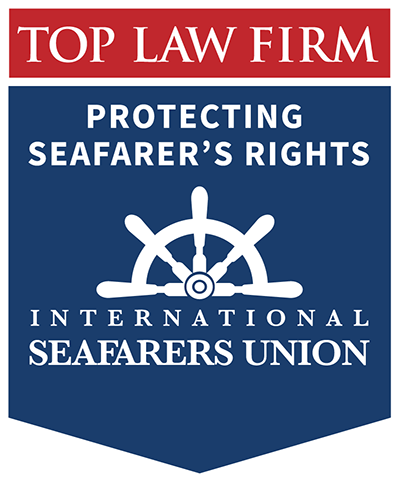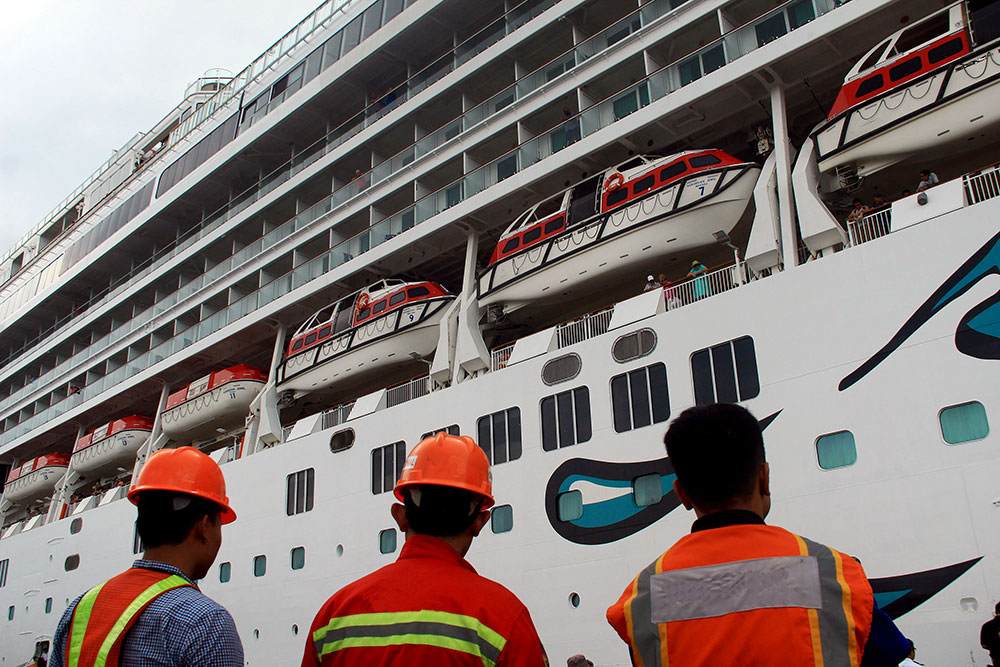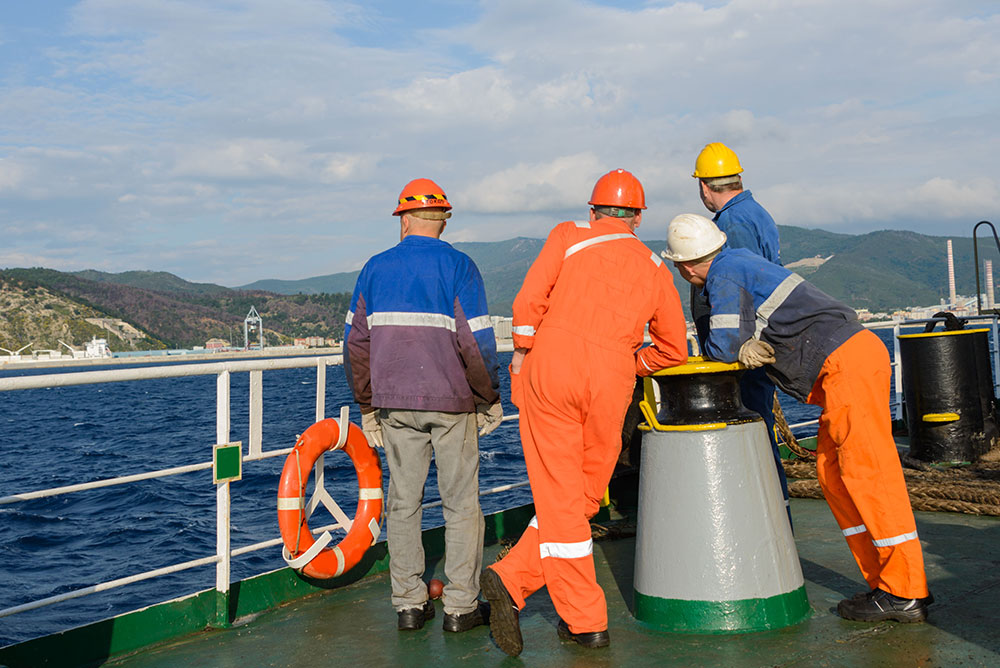Our Award Winning Seaman’s Rights Lawyers Will Fight for Your Rights
Our seafarer’s rights attorneys at Lipcon, Margulies & Winkleman, P.A. are the United States’ leading maritime injury and accident attorneys. We have dedicated more than 50 years of trial experience to advocating for the rights of injured seamen across the country. When someone else’s negligence or wrongful act is the cause of your injuries, you have an opportunity to demand they be held accountable and access the compensation and benefits you are too. We are proud of our history of success in representing crewmembers from around the globe and we continue to fight, every single day, for the rights of crewmembers.
We have 16 attorneys strategically located across eight office locations across the nation, so no matter where your injuries occurred, you have access to the legal guidance and support you need, when you need it most. We opened our doors back in 1971, and have taken on more than 3,000 cases and recovered more than $300 million for the suffering and injuries our clients endured. Our founding attorney, Charles Lipcon, has handled a substantial number of maritime and seamen injury cases that have shaped how the United States handles maritime injury claims and seamen injuries.
Collectively, our firm has been selected by US News & World Report as one of the “Best Law Firms” ® every year since 2016. Four of our attorneys have also been chosen as “Best Lawyers” ® in America. We have more than 200 years of combined experience and Mr. Lipcon was selected as “Lawyer of the Year” ® in Admiralty and Maritime (Miami) by US News & World Report in 2020, making us uniquely qualified to protect your rights. We have even appeared on numerous news programs and talk shows as experts regarding maritime injury and seamen’s rights.
Seafarers who suffered severe illness or injury while working on or around the navigable waters may have the right to compensation and benefits under the Jones Act or other applicable maritime laws. Learn more about how we can help you access the financial compensation you are entitled to when you contact a seafarer’s rights attorney at Lipcon, Margulies & Winkleman, P.A. as soon as possible for a 100% free consultation.
Your Right to Compensation
Under the Jones Act, a seaman injured in the course of employment can bring a lawsuit against his employer. Our Jones Act law firm has represented many seamen and maritime employees who were injured or suffered death while working on sea vessels, including cruise ships, yachts, cargo ships, tug boats, oil rigs, and barges.
Generally, all seafarers have rights under maritime laws to:
- Wages and tips
- Medical care
- Food and shelter
- Transportation
- Contract benefits
Further, a seaman who becomes ill or injured while in the service of a vessel due to the fault of the seaman’s employer, is entitled to compensation for the seaman’s injuries, lost wages, and loss of earning capacity
Seaman’s claims encompass the rights of a seaman aboard any type of vessel. To be considered a “seaman,” the worker must aid in the navigation of the vessel or contribute to the mission of the vessel. For example, entertainers aboard cruise ships are considered seamen because they aid in the mission of the vessel – which is to provide cruise vacations. Also, the worker must spend a significant amount (generally 35% or more) of his or her time working on a vessel, rather than on land. Although the work performed might not always be on the water, if a “vessel” is not involved, it is unlikely that the worker will be considered a seaman. In addition, a non-seaman worker performing traditional seaman’s work might also be considered a seaman for the purposes of the law.
If you have become ill or have suffered an injury while working onboard a vessel, or on land while in the service of a vessel, a boating accident attorney at our firm will help you recover the maximum compensation to which you are entitled under the law.
See What Our Clients Have To Say
Cruise Ship Crew Member Injury

Hi, my name is Anya and I am from Slovenia and I was a crew member on a cruise ship …
Cruise Ship Crew Member Injury

My name is Karen Torres and I am from Peru, Lima. I am very pleased with all the support that …
Cruise Ship Crew Member Injury

Hello, my name is Bojan and I am from Serbia and I am an injured crew member. I’ve never had …
Cruise Ship Crew Member Injury

Hello, my name is Jeremy Evans, I live in Los Angeles, California. I was injured in Alaska working on a …
Examples of Cases Regarding Seafarers’ Rights
A Seaman May Not Be Held Contributorily Negligent
In SIMEONOFF v. HINER and CLAREHINER the UNITED STATES COURT OF APPEALS FOR THE NINTH CIRCUIT 2001 U.S. App. LEXIS 8518; 2001 Cal. Daily Op. Service 3621;2001 Daily Journal DAR 4461 the court dealt with an extremely important issue, that being under what circumstances would a seaman be negligent for following an order that put the seaman in danger. At sea, there is no time for a seaman to leisurely consider the safety of orders that are received. If each seaman were charged with that duty, chaos could follow. If seamen could pick and choose which orders to follow, orders would lose their meaning.
John Simeonoff injured his foot while crab fishing on a commercial vessel, the F/V SAGA (“SAGA”). With the aid of a cruise ship injury lawyer, Simeonoff brought a claim pursuant to the Jones Act, 46 U.S.C. § 688 et seq., and general maritime law against the SAGA and ship owners, Clare and Todd Hiner (“Hiners”) claiming negligence and unseaworthiness. After a bench trial, the district court found the SAGA and the Hiners seventy percent negligent, and Simeonoff thirty percent negligent. The court found $163,500 in total damages and, reducing that by thirty percent, awarded $114,450 to Simeonoff.
On appeal, Simeonoff argued that the district court erred in finding appellant contributorily negligent. The appeals court reversed the district court’s judgment on this issue. The court found that Simeonoff could not be held contributorily negligent for responding to an urgent, yet general, call to the vessel’s crew for assistance; therefore, the district court clearly erred by reducing his monetary award based on a finding of contributory negligence.
Burden of Proof on Shipowner
Luigi Malta was injured while working on a ship owned by the Defendant United States of America. After the plaintiff Malta received treatment, the defendant USA’s doctor declared that Mr. Malta had achieved maximum medical cure. A second doctor disagreed as to no further medical care being needed and recommended a second operation on the plaintiff’s knee. The plaintiff sued, seeking maintenance and cure benefits based on the second opinion as to the need for surgery.
The case was tried to the court in Malta v the United States 2001 U.S. Dist. LEXIS 4769 (March 30, 2001). Both doctors testified during the bench trial. The court found that both were credible and that they simply had a difference of opinion.
Thus, relying on the defendant’s burden to prove unequivocally that the plaintiff had reached the maximum medical cure, the court found for the plaintiff. Plaintiff’s expert testified that he hoped a second surgery on the plaintiff’s knee would both alleviate the plaintiff’s pain and improve the functioning of the plaintiff’s knee. Since the surgery was not to be merely palliative, the plaintiff was entitled to receive maintenance and cure.
Equally strong evidence supported each party’s position; thus, the outcome turned on who bore the burden of proof. The burden, and thus the loss, fell on the defendant.
The principles applied in this decision are extremely important both to ship owners and to seaman. A seaman should get a second opinion from another doctor in those situations where he or she feels that they have not made a satisfactory recovery. Shipowners and employers of seamen should follow the suggestions of the doctor giving the second opinion even if they agree with the primary doctor’s opinion.
Seaman’s Maintenance Rate Includes Seaman’s Full Mortgage Expense
In HALL and STUART v NOBLE DRILLING (U.S.)INC.; NOBLE DRILLING SERVICES, INC., 2001 U.S. App. LEXIS 2149 (C.A. 5th Circuit) February 14, 2001, a landmark appellate decision was handed down on the issue of maintenance including a seaman’s full mortgage payment.
Both Hall and Stuart worked on offshore rigs when they were injured. Suits were filed which included claims for maintenance. The cases were consolidated for a trial on the issue of the daily maintenance rate. Maintenance is money that an injured seaman receives for food and shelter until the point of maximum medical improvement is declared.
Both Hall and Stuart lived with their families and both were obligated to pay the full mortgages for their houses. The shipping companies argued that the mortgage payments should be prorated with the other family members and only that portion applying to the seaman included in the maintenance rate. The appellate court rejected this position and reasoned that would result in a seaman who lived alone in a large home getting one hundred percent of his mortgage but that a seaman who lived with a family in a small home and for whom prorating was applied receiving much less even though the smaller home had a much smaller mortgage than the larger home.
Also, the appellate court indicated that prorating would cause problems if a new child was born or part of the family moved out. Different prorating would have to be done based on the number of people in the house, which would add to the difficulty in establishing a daily maintenance rate.
The appellate court noted that if the full mortgage payment were not paid the seaman would lose his house.
All in all, this is a very good decision for seamen. Unfortunately, it does not apply in those circumstances where there is a union and a collective bargaining agreement. These collective bargaining agreements typically limit maintenance to $8 a day. This is a totally unreasonable amount of money and is carried over from rates that were agreed to in the 1950s.
Injured seamen should gather up their housing expenses including mortgage payments, electricity, water, gas, insurance, property taxes, and submit them to their employer. The employers should look into whether or not these expenses are increased to the presence of other family members.
Frequently Asked Questions
What do I do if I suffered a back injury working on a cruise ship?
I was injured on the vessel, and I am a Jones Act Seafarer - does the Line need to pay for my medical care?
What if I am not a Jones Act Seafarer, and have been injured while employed on the vessel?
If I was injured while employed on a vessel, do I have a case?
Our Award-Winning Maritime Law Firm Demands Maximum Compensation and Protects Seafarer’s Rights
Having four of our lawyers be selected as “Best Lawyers” ® and our firm chosen as one of the “Best Law Firms” ® by US News & World Report annually since 2016, our seafarer’s rights attorneys at Lipcon, Margulies & Winkleman, P.A. have extensive knowledge of maritime injury laws, the Jones Act, and seamen’s rights. As a top-rated litigation law firm, our team has the unique training and experience you need to demand justice. Let us put our wealth of knowledge and experience to work for you.
If you or someone you love has been seriously injured or killed in an accident at sea, we are here to help you make the liable party pay. Contact us today for a confidential consultation or call our office at 877–233–1238 to speak with an experienced seafarer’s rights attorney.
Seafarers Rights Lawyers
Other Practice Areas
- Cruise Ship Accidents
- Cruise Ship Rape Lawyers
- Shore Excursion Accident
- Seafarers Rights
- Class Action Lawsuits
- Cruise Passenger Disappearances
- Cruise Ship Asbestos Claims
- Cruise Ship Drowning Accidents
- Cruise Ship Overboard Accidents
- Cruise Ship Medical Malpractice Lawyers
- Flowrider Accidents
- Tender Boat Accidents
- Gangway Accident Attorney
- Cruise Ship Water Slide Accident Lawyer
Seafarers Rights Lawyer Locations







